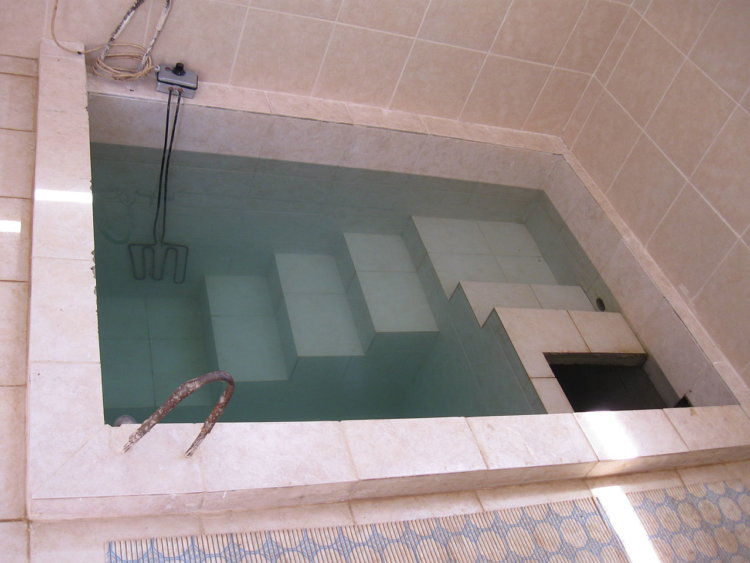
This is the fourth post in a series of articles by Mayim about her divorce. For all the posts, click here.
I didn’t grow up knowing anything about the mikveh, the ritual bath religious women enter before their wedding and each month after their menstrual cycle ends. When I learned about it as a teenager, it sounded gross. It sounded like women were treated horribly there, and it sounded like Judaism thought I was dirty and it did not appeal to me at all.
As I increased my Jewish learning at UCLA and specifically through UCLA Hillel, I learned that there were movements of women who were “taking back” mikveh as a transformative and mystical experience. Women who, after divorce, cancer treatment, miscarriage or abortion, were entering the sacred waters to rejuvenate and start again. They were liberating the experience from halachic restrictions and were making a new world of mikveh open to all women. It was beautiful, I thought.
As I grew in my observance and in the months leading up to my wedding, I studied with a kallah (marriage preparation) teacher and learned that mikveh was not a punishment or a judgment of uncleanliness. Rather, it was an affirmation of spiritual purity and possibility, and that it could be an empowering and special experience to engage monthly in this ritual and the halachos (Jewish laws) of not engaging in sexual activity for the days of your menstrual cycle and the week following. As I have written about here, I embraced the mikveh and the surrounding halachos with great reverence and appreciation.
This makes it all the more complicated that, as a divorced woman, I do not go to the mikveh anymore. Since the regulation of your menstrual cycle and ovulation is primarily what I used the mikveh for, I do not need the mikveh anymore. And I suppose in some fascinating turn of events, it doesn’t need me.
I miss the mikveh. I miss the rhythms of it, and how it marked the loss of an egg and the potential to create life when I was trying to get pregnant, and how it marked the phases of my cycle even when I was not trying to get pregnant. I miss it.
Why, you might ask, don’t I go anyway? If certain “progressive” women go after life cycle events, why not go to mark the end of my marriage? Or the new phase of life I am embarking on? (You may also want to take note of the recent debate about whether unmarried sexually active young women should or shouldn’t be permitted to use Orthodox mikvehs… After all, mikvehs in Orthodoxy are for married women, but what if a young woman from a religious family wants to immerse? It’s tricky.)
I am not a perfect observant person, and my observance has shifted a lot since the divorce and will continue to. However, I still identify as a halachic person. I like the regiments and structure of Orthodox mikvehs. It’s important to me to honor and respect that. I would not feel comfortable immersing in an Orthodox mikveh as a divorced woman. And I don’t know that I’d feel at home at a mikveh that wasn’t designed for those purposes.
I will never get tired of writing about the complexity of tension in our lives as Jews: respecting tradition, being bound to it, feeling trapped by it, feeling overwhelmed by it. In a perfect world, I might have made halacha different. I might have made a lot of things different. But I’m not God, and I don’t want to change rules just because they make me uncomfortable. I want to struggle within the limits of my understanding and my devotion.
I don’t have a daughter. I will never know the joys of taking my daughter to the mikveh before her wedding the way my mother did with me. And I don’t know if my sons will marry a woman who wants to go to the mikveh. If they do, I hope they will allow their future mother-in-law to come with them and sit in the waiting room.
If that happens, I will likely cry as I remember scrubbing my own young skin clean before my wedding; inspecting every inch of my body for anything that would separate me from my Creator in the waters that have the power to make me born again, soaking in anticipation of being loved and desired when I am most vulnerable and most pure.
And I hope that when my future daughter-in-law dries herself off after emerging clean from the waters, she will forgive the wet tears of this old woman. She will have to dry herself again, shaking off the waters of regret and sadness and loss that only a woman who has not been to the mikveh in decades can shed.
A version of this post previously appeared on Mayim’s blog on Kveller.com, June 18, 2013.




 Read More From Mayim
Read More From Mayim
Grok Nation Comment Policy
We welcome thoughtful, grokky comments—keep your negativity and spam to yourself. Please read our Comment Policy before commenting.